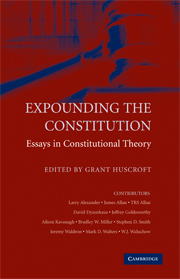Book contents
- Frontmatter
- Contents
- Preface
- Contributors
- Introduction
- PART I MORALITY AND THE ENTERPRISE OF INTERPRETATION
- PART II JUDICIAL REVIEW, LEGITIMACY, AND JUSTIFICATION
- 5 Constitutions, Judicial Review, Moral Rights, and Democracy: Disentangling the Issues
- 6 The Incoherence of Constitutional Positivism
- 7 The Travails of Justice Waldron
- 8 Deference or Defiance? The Limits of the Judicial Role in Constitutional Adjudication
- PART III WRITTEN AND UNWRITTEN CONSTITUTIONAL PRINCIPLES
- Index
7 - The Travails of Justice Waldron
Published online by Cambridge University Press: 25 July 2009
- Frontmatter
- Contents
- Preface
- Contributors
- Introduction
- PART I MORALITY AND THE ENTERPRISE OF INTERPRETATION
- PART II JUDICIAL REVIEW, LEGITIMACY, AND JUSTIFICATION
- 5 Constitutions, Judicial Review, Moral Rights, and Democracy: Disentangling the Issues
- 6 The Incoherence of Constitutional Positivism
- 7 The Travails of Justice Waldron
- 8 Deference or Defiance? The Limits of the Judicial Role in Constitutional Adjudication
- PART III WRITTEN AND UNWRITTEN CONSTITUTIONAL PRINCIPLES
- Index
Summary
Imagine for a moment that there exists a smart, well-read, articulate legal academic, well-versed in constitutional law and more so in legal philosophy (indeed in moral and political philosophy as well). Imagine, too, that this person has taken a particular interest in bills of rights. He has written extensively about how such instruments fail to take seriously the right to participate in social decision-making, including decisions about rights and how rights ought to play out and rank against each other. In other words, he has turned the strong-rights-based arguments grounded in autonomy and equality – arguments relied on by so many bill of rights supporters – back onto those same people who defend the privileged position such instruments afford to unelected judges. Imagine, indeed, that this person has attempted to run through all the arguments made in favour of strong judicial review under a bill of rights and to rebut each and every one of them and that, to some readers, perhaps more than some, he has been immensely successful in those attempts.
Let me stop. There is no need to imagine any of the above. Jeremy Waldron is, without doubt, the leading bill of rights critic writing today and what I just set out was nothing more than an abbreviated, and thinly veiled, description of his stature and position. There is no need to imagine critics of bills of rights and no need to imagine a particular one who is all of the above.
- Type
- Chapter
- Information
- Expounding the ConstitutionEssays in Constitutional Theory, pp. 161 - 183Publisher: Cambridge University PressPrint publication year: 2008
- 4
- Cited by



